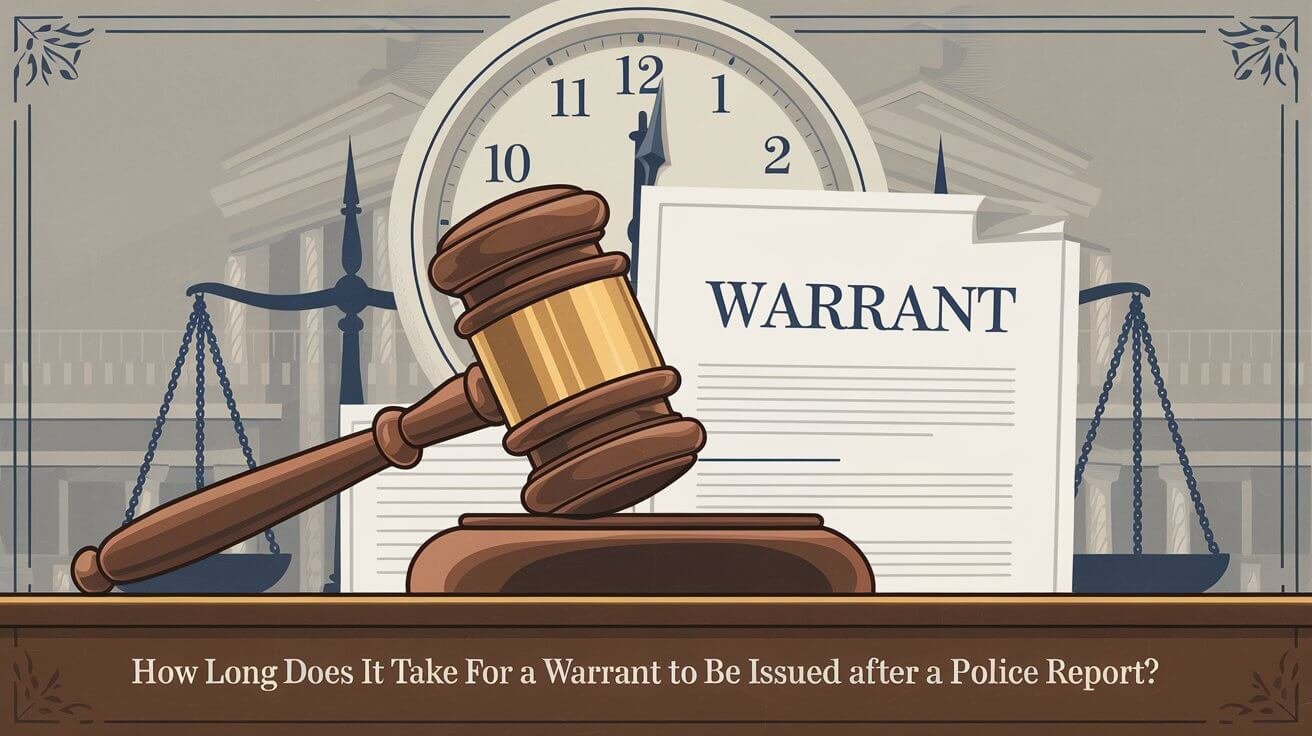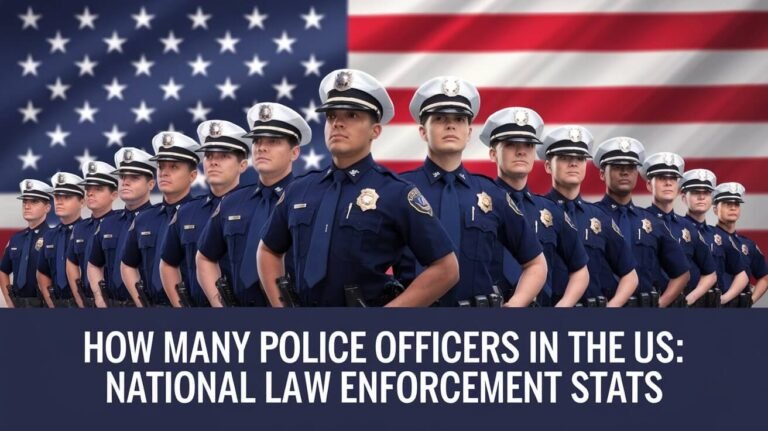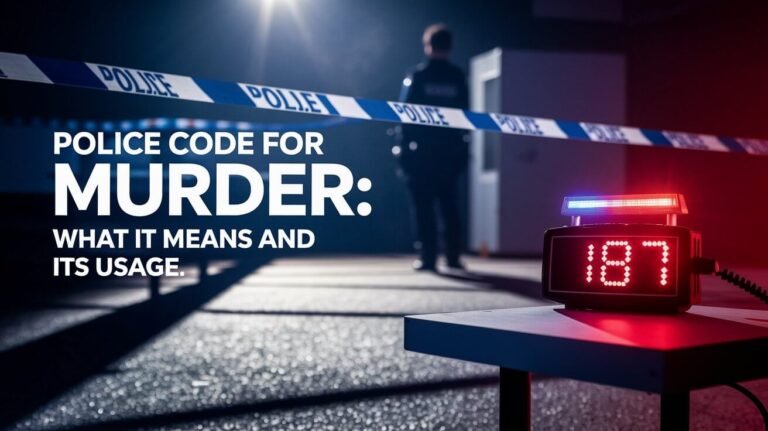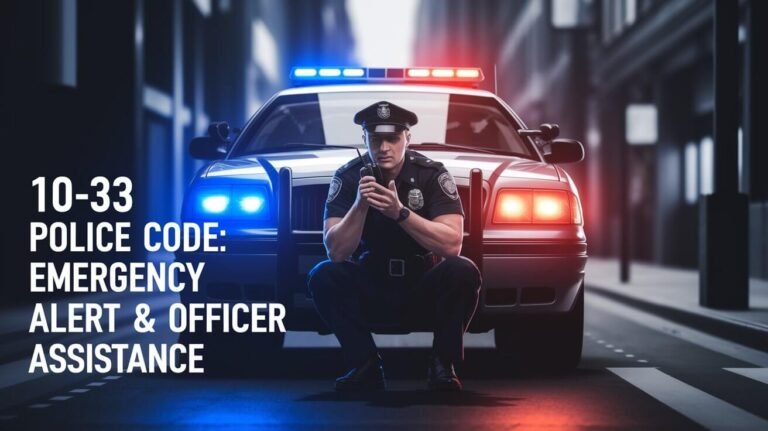How Long Does It Take For A Warrant To Be Issued After A Police Report Is Filed?

In the complex web of the criminal justice system, a key question often arises. How long does it take for a warrant to be issued after a police report is filed? The answer is not straightforward. It depends on the type of warrant, the case’s circumstances, and the procedures followed by law enforcement and the courts.
Types of Legal Warrants in the Criminal Justice System
The criminal justice system uses different legal warrants to help law enforcement. These warrants have their own purposes and rules. Knowing about these warrants helps us see how well the justice system works.
Search Warrants vs. Arrest Warrants
Search warrants let police search places for crime evidence. They need to show there’s a good chance of finding evidence. Arrest warrants, on the other hand, let police catch people who might have committed a crime. They need to show there’s a good chance the person did something wrong.
Bench Warrants: Purpose and Process
Bench warrants come from judges or magistrates. They’re for people who didn’t show up in court or didn’t follow a court order. The goal is to make sure the person shows up in court.
Requirements for Different Warrant Types
- Search warrants need proof that evidence of a crime is in the place to be searched.
- Arrest warrants require proof that someone committed a crime.
- Bench warrants are for people who didn’t show up in court or didn’t follow a court order.
- All warrants must be approved by a judge or magistrate. They need to include the defendant’s name, the crime, and who issued it.
Warrants are key in the criminal justice system. They give police the power to search, arrest, and enforce court orders. Knowing about the different types of warrants helps keep the justice system fair and efficient.
Law Enforcement Procedures for Filing Police Reports
Police reports are key in the criminal justice system. They start investigations and can lead to warrants. Officers write these reports, detailing crimes, witness statements, and evidence.
The quality of police reports affects how fast and likely a warrant is issued. Agencies follow strict rules to make sure reports are accurate and complete.
- Police officers gather info from victims, witnesses, and evidence at crime scenes.
- They write a detailed report about the incident, who was involved, and their initial steps.
- Reports include witness statements, evidence, and the officer’s findings.
Quick and detailed police reports are vital. They are the base for legal actions. By following procedures, officers make the reporting process smooth and help solve crimes.
| Topeka Police Department Report Procedures | Timeline |
|---|---|
| Crash reports available for purchase online | 10-12 business days after incident |
| Records Unit review of police report requests | 3 business days |
| Convenience fee for online police report requests | $9.00 |
| Price for non-motor vehicle crash police reports | $2.00 for general public |
| Records Room operating hours | Monday-Friday, 8:00 a.m. to 5:00 p.m., excluding holidays |
How Long Does It Take For A Warrant To Be Issued After A Police Report Is Filed
The time it takes to get a warrant after a police report can change a lot. It depends on many things in the criminal justice system. Some cases might get a warrant in days, while others could take weeks or months.
Factors Affecting Warrant Processing Time
How complex the case is, how strong the evidence is, and the workload of the area all affect the time. Serious crimes or threats to public safety might get faster action. Less urgent cases might wait longer.
Standard Timeline for Warrant Issuance
Here’s a general idea of when warrants might be issued:
- Simple cases: Warrants might come in a few days
- Complex investigations: It could take weeks or months
- High-priority cases: These might get processed faster, in days
Priority Cases and Expedited Processing
Some places focus more on warrants for violent crimes, sexual offenses, or big public safety risks. These “priority cases” often get quicker action, with warrants issued sooner than usual.
| Warrant Type | Typical Processing Time | Priority Processing Time |
|---|---|---|
| Search Warrant | 1-2 weeks | 2-3 days |
| Arrest Warrant | 2-4 weeks | 5-7 days |
| Bench Warrant | 1-2 weeks | 3-5 days |
Keep in mind, these times are just estimates. They can change based on the area and the case details. The justice system tries to balance how fast warrants are issued with the need for careful investigations and protecting rights.
Role of Probable Cause in Warrant Issuance
Probable cause is key in getting legal warrants in the criminal justice system. It means law enforcement must show they believe a crime was done and evidence will be found where they look. Judges check the facts in warrant applications to see if probable cause is there before they issue the warrant.
Having probable cause is important. It protects people’s rights but also lets police investigate crimes. This rule makes sure warrants are only given when there’s enough evidence. It stops illegal searches, seizures, and arrests.
Getting a warrant often takes teamwork between police and the district attorney’s office. Police collect evidence and write detailed affidavits. They then apply for a judge’s review. Judges look over the evidence to make sure the warrant rules are met before they approve it.
If probable cause isn’t shown, evidence from the warrant might be thrown out. Defendants can challenge the warrant’s validity. Judges decide based on the affidavit without a full hearing. This shows how important it is for police to document everything accurately.
Police Investigation Process After Report Filing
After a police report is filed, officers start a detailed criminal investigation. They aim to collect more evidence and build a strong case. This includes using evidence collection and witness statement processing to meet all the necessary documentation.
Evidence Collection Methods
Crime scene investigators collect and keep physical evidence like weapons, bloodstains, and fingerprints. They also watch suspects or people who might have useful information.
Witness Statement Processing
Detectives talk to victims, witnesses, and suspects to get more information. They also check social media and online platforms for clues.
Documentation Requirements
Officers document everything they find and do during the investigation. This is important for the legal process. It helps show there’s enough probable cause for a warrant.
| Investigative Technique | Timeline | Purpose |
|---|---|---|
| Physical Evidence Collection | Immediate to ongoing | Gather forensic and material evidence from the crime scene |
| Witness Interviews | Immediate to ongoing | Gather relevant information and testimony from individuals with knowledge of the incident |
| Surveillance Activities | Ongoing | Monitor suspects or individuals with potentially useful information throughout the investigation |
| Social Media and Online Investigations | Ongoing | Gather evidence and track discussions related to the criminal activity |
| Undercover Operations | Ongoing | Gather evidence in specific types of crimes, such as drug offenses or pornography |
Judicial Review and Approval Process
The judicial process is key in the warrant approval system. Judges carefully check warrant applications to make sure they follow the law. They might ask officers or prosecutors questions under oath about the application’s facts.
This step is important to keep law enforcement in check. It helps prevent unreasonable searches and seizures.
Judges look at all the facts to see if there’s enough reason to issue a warrant. They check if the information in the affidavit is strong enough. This means they see if there’s a good chance a crime was done and evidence will be found.
The judicial review and approval process has several steps:
- The police officer or prosecutor gives a sworn affidavit to the judge. This explains the reasons for the warrant.
- The judge looks over the affidavit and might ask more questions under oath.
- If the judge thinks the warrant is legal, they issue it. Then, it’s filed with the County Court Clerk’s office.
- The warrant or affidavit is part of the court file. You can find it through the clerk’s office or online court records.
This careful oversight makes sure the warrant approval process follows the legal procedures. It also protects the rights of everyone in the judicial process.
Rights and Responsibilities During Warrant Processing
When a warrant is being processed, both the suspect and law enforcement have key roles. Suspects have important rights, like protection against unfair searches and seizures. Law enforcement must follow strict rules to respect these rights.
Legal Protections for Suspects
People facing a warrant have the right to safety in their homes and belongings. Police need to show they have a good reason and get a judge’s approval before searching or arresting. If these rights are broken, evidence might be thrown out or the case could be dropped.
Obligations of Law Enforcement
Police must tell people they are coming and why before entering. They should also give a chance for peaceful surrender. Plus, they must share the warrant details with the suspect, like who signed it and why.
| Legal Protections for Suspects | Obligations of Law Enforcement |
|---|---|
| Protection against unreasonable searches and seizures Right to be secure in persons, homes, and belongings Requirement of probable cause and judicial approval for warrants Potential for evidence suppression or case dismissal for violations | Announce presence and purpose before entering premises Allow peaceful surrender, if possible Provide suspects with warrant details upon request |
Common Reasons for Warrant Delays
Securing a legal warrant can often be a time-consuming process. The goal is to protect everyone’s rights and follow the law. But, many things can slow down the process.
One big reason is if police reports are not complete. If the report is missing important info, it needs more work before a warrant is given. Defense lawyers can also cause delays by questioning the warrant’s reasons or how it was made.
Big or complicated cases need more time to check. This means a longer wait for a warrant. Also, if there’s not enough resources, things get backed up, making it even longer.
Problems like mistakes or bad communication can also cause warrant delays. Making sure everything is right and working together better can help fix these issues.
The aim is to act fast but also follow the law and protect everyone’s rights. Even with administrative issues, the system tries to get warrants out quickly and fairly.
Conclusion
The time it takes to issue a warrant after a police report varies a lot. This depends on the case details, the area’s rules, and legal needs. Knowing how the criminal justice system works helps understand why it takes time.
Some warrants are issued fast, while others need more time for investigation and checks. The strength of the evidence, how complex the case is, and how urgent it is can affect the time needed.
The process of getting a warrant is a careful balance between law enforcement and the rights of the accused. Learning about the different types of warrants and the steps involved helps us see how it affects the justice system.






